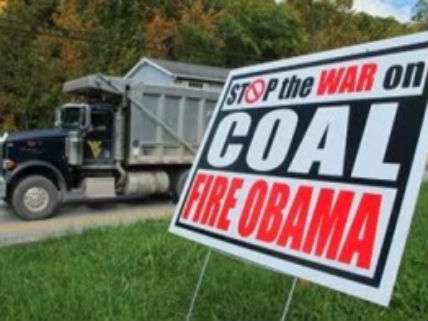Natural Gas Ambush Killed Off Coal Mining Industry, Not Obama's 'War on Coal'
Coal got mugged by natural gas, not regulators.

Way back in 1991, Jesse Ausubel, head of the Human Environment Program at Rockefeller University, predicted that humanity would be following the "light path" toward progressive decarbonization of our primary energy consumption. "For 200 years, the world has progressively lightened its energy diet by favoring hydrogen atoms over carbon in our hydrocarbon stew," he noted. Humanity had been following a trajectory of fuels in which the ratio of hydrogen to carbon atoms kept increasing, moving from wood, to coal, to oil, to natural gas and, ultimately, Ausubel argued, to burning pure hydrogen.
In Ausubel's scenario, climate activists drop their objections to nuclear power which would generate enough electricity at night to crack open water to produce hydrogen as a transport fuel. Well maybe. In any case, the United States has been decarbonizing its primary energy sources with the result that the country's greenhouse gas emissions in 2014 were 9 percent below 2005 levels.
So why is the U.S. economy decarbonizing? Because of Obama's regulatory "war on coal" or because of technological progress? Researchers at the Great Lakes Energy Institute at Case Western Reserve University have just published a study in The Electricity Journal that traces the prices and fates of natural gas versus coal in the production of electricity. As the researchers point out, the regulations under which the electric power generation industry operated were adopted in the 1990s and only changed this past summer. However, the number of coal-fired generation plants started declining around 2008 as cheaper natural gas from shale fracking revolution began to come onto the market. The Case Western Reserve University press release outlines the case:
Between 2007 and 2015, shale gas prices dropped almost in half, positioning natural gas to outprice coal mined in four of the five U.S. coal regions…the benchmark gas prices ("Henry Hub" prices) in the past four years [have been] cheaper than the coal of the two regions in Appalachian for over 88% of the months. Further, gas has been cheaper than the coal of Appalachia, Illinois, and the Rockies for over 57% of the months. Even the cheapest coal, in Wyoming's Powder River Basin, competes poorly in the great population centers east of the Mississippi once rail transport of $0.03 per ton-mile is considered. That prompted investment in pipelines and gas storage infrastructure that have made gas even more competitive.
ScienceDaily further reports:
Consumption of coal continued to grow under those 1990-era EPA rules until 2008, and then went into steady decline, dropping by 23 percent from 2008 thru 2015.
The data show the drop in those years to be correlated with the shale revolution, as natural gas production increased by a factor of more than 10 and its price dropped in half, the researchers say. And, due to the continuing -- and in some cases accelerating -- technological and economic advantages of gas over coal, the decline in coal is expected to continue at least decades into the future.
"Some people attribute the decline in coal-generated electricity to the EPA's air-quality rules, even calling it 'Obama's war on coal,'" said Mingguo Hong, associate professor of electrical engineering and computer science at Case Western Reserve and co-author of the study. "While we can't say that the EPA rules have no impact -- as, for example, discouraging the building of new coal power plants because of the expectation that tougher air-quality rules will clear the courts -- the data say the EPA rules have not been the driving force."
Hong, co-director of the Electricity Systems Research Lab at Case Western Reserve, and Walter Culver, a founding member of the Great Lakes Energy Institute Advisory Board at the university, say the data show that shale-gas competition is what's been hurting coal as of today. They expect that, as wind and solar sources of electricity continue to improve, they will be tough competitors to coal in the not-distant future. …
"If you're a power plant operator and you see gas supply is continuing to increase and natural gas can do the job cheaper -- by a lot -- the decision to switch from coal is pretty easy," Culver said. "As we look toward the future, we see no natural mechanisms that will permit coal to recover," Culver said.
Largely thanks to the shale gas revolution, the U.S. does appear to be treading Ausubel's light path toward energy decarbonization. Coal got mugged by natural gas, not regulators.


Show Comments (86)